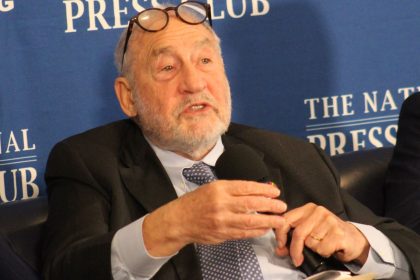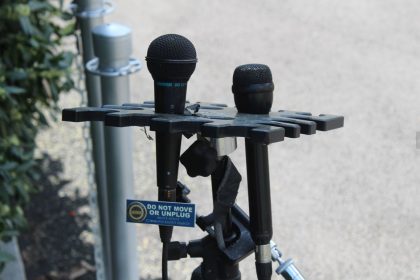Study Says Corporations Should Engage In Issues, But Must Explain Positions

A study from Global Strategy Group finds most Americans, regardless of their political leaning, believe corporations should weigh in on political and social issues, despite the fact some of their actions might inspire a temporary backlash.
The key, explained Julie Hootkin, a partner at the public affairs and polling firm and lead author of the study, is that corporations clearly articulate why they are taking a stand on a particular issue.
The study itself was born of a consistent narrative that Hootkin and her colleagues saw emerging as they helped various client companies navigate public affairs-related issues.
“What we realized was that for a variety of reasons, more and more companies were having to proactively think about the work they did in what we call the ‘issue space,’” she said.
The question was, why was this happening? The anecdotal evidence suggested only a small percentage of corporations engaging in political or social issues reactively, doing so because they either had or believed that they were about to become ensnared in a crisis.
About six years ago, Global Strategy Group decided to take a deeper look at the data, and what it found was that there were actually two significant areas to consider: the minds of American consumers, and how companies respond to consumers’ concerns and interests in certain issues.
“Broadly, we began asking what the expectations of Americans were when it came to corporate engagement in political and social issues. What were they thinking about? What was top of mind? How important was it?” Hootkin said.
“The second piece was looking at what we found from a more actionable perspective,” she said. “Okay, assuming we find out that they care, what does that mean? What issues can companies engage in? How do they do it?”
What no one could have anticipated was how hot a topic the intersection of corporate life with the issue space would become in the six years Global Strategy Group has issued reports on the subject.
“It’s really evolved, “Hootkin said.
“I mean, based on our tracking [of the data] the expectation that corporations would engage in issues has been around for many years,” she said. “But that expectation has intensified dramatically.
“One thing I find interesting is that companies are now thinking explicitly about this and feel more pressure to act in this space,” Hootkin added.
“Of course, that in part is a response to the president, but not entirely,” she said.
Equally important, the study suggests, is that America itself has changed and individuals have become more engaged in a broader range of issues. And along with that, they’ve been more comfortable with companies stepping out and taking a stand.
“It just looks different today,” Hootkin said. “I think people have always sort of had a fundamental expectation that companies would be good citizens, right? And years ago, that meant a company might take an active role in veterans issues or educational issues or sustainability.
“What we’ve found is that there’s now much more room for companies to engage in any number of issues,” she said. “The world is changing. We have new challenges. And to say to companies that they can only engage is the same issues they embraced in the past would sell them short and be a disservice to consumers who are looking for corporate engagement.”
But what the study makes plain is that with greater opportunity comes a greater need for companies to clearly explain their motivations.
“That’s the challenge,” Hootkin said. “And sometimes the reason a company acts in a certain way on an issue isn’t immediately obvious to the general public.
“For instance, it could be that they’ve embraced an issue because it is important to their employees. Employees are an important stakeholder, and companies are looking to retain talent,” she said. “Also, we know more and more Americans, and Millennials in particular, want to work in a place that shares their values.
“Consumers, certainly, are another important audience. The communities in which companies exist and their employees live and work are increasingly important. Sometimes taking a stand on an specific issue is the best business decision to make,” Hootkin said.
“I think consumers broadly are willing to accept any one of those rationales. It’s just really critically important that companies articulate the reason why they have chosen to step out or engage on a particular issue,” she said.
Hootkin said the study found Millennials, as a group, are more likely to actively seek out information about a position a company is taking than other age groups, and that generally, “young people are more proactive when it comes to understanding what companies are doing on the political and social issues that mattered to them.”
But, she added, the same could be said of Democrats as compared to those of other party affiliations.
While Democrats and Republicans seem to agree that it is appropriate for companies to take positions on issues, the study found that Democrats are more likely than Republicans to reward a company for taking a position they agree with by buying its products.
“What is fascinating is that Democrats and Republicans are equally as likely to boycott a company for taking a position they don’t agree with,” Hootkin said.
Another finding in the report that Hootkin said she found noteworthy is that Americans, by and large, are willing to accept a company taking an action they don’t agree with as long as they can understand the firm’s motivation for taking it.
“Patagonia is a really good example of that,” she said.
In 2016, the outdoor goods and apparel company closed all of its retail stores and gave all of its employees a day off to vote, stressing that it wasn’t being partisan, but rather wanted to encourage civic engagement.
Two years, however, it took a very different step — actually throwing its support behind two Democratic candidates: Jacky Rosen, who was running for Senate in Nevada, and Senator Jon Tester who was running for re-election in Montana.
In a statement announcing its decision, Patagonia said it was making the move “because of the urgent and unprecedented threats to our public lands and waters.”
The two candidates would help protect natural resources in Nevada and Montana, the company said.
“We need [Rosen’s] leadership to protect Nevada’s economy and the basic health of its people, so the business community can thrive and so Nevadans can prosper,” Patagonia CEO Rose Marcario said in a statement.
Founder Yvon Chouinard spoke up for Tester, calling him ” a real advocate for hunters, hikers and Montana’s thriving outdoor economy.”
But the company stressed in its announcement that its endorsements were less about politics and more “about standing up for the millions of Americans who want to see wild places protected for future generations.”
“What we found was that even a majority of Republicans viewed Patagonia’s actions as appropriate because protecting public lands was consistent with who they are as a company,” Hootkin said.
“So even though it was an overt public act, as opposed to pure advocacy, people understood why they did it,” she said. “And again, that goes back to what may be our core finding — that when a company acts in the issue space, it has to do so in an authentic way and be able to really articulate the motivation behind the position they’ve taken.”
Hootkin also lauded Nike for the same adherence to brand when it decided to feature Colin Kaepernick, the former quarterback for the San Francisco 49ers, in its 30th anniversary “Just Do It” ad campaign.
Kaepernick appeared in a TV spot and a print ad offering an original take on Nike long standing slogan.
“Believe in something. Even if it means sacrificing everything. Just Do It,” Kaepernick said.
The sacrifice in question was a reference to Kaepernick’s kneeling protests against police brutality before NFL games.
Some longtime customers of the sportswear company said they would boycott it until the ad stopped running; others destroyed their Nike gear on social media.
But in the first month the advertisements were on the air and in magazines, the company’s share price actually increased by some $6 billion dollars.
Nike prevailed, Hootkin said, because ultimately the Kaepernick ads were true to the image most consumers had of the company.
“Those advertisements aligned with who they are and what they’ve always delivered to their customers,” she said. “And in the long run I don’t believe they lost any customers they otherwise would have had.”
Hootkin likened the situation to a political campaign. “Like a candidate preparing to speak on an issue for the first time, I think all companies need to kick the tires and be thoughtful about who their core customers are. You have to ask yourself, ‘How will this resonate with them?’ Nike did that.
“It also realized that there are people who it will never connect with, the people who will always buy Adidas and never buy Nike, and then that there is some group of folks in the middle who might be open to you if you can sort of connect with them in a particular way,” she said.
“In this case, I think Nike was astute enough to understand who their core customers were, and they were able to take a stand and have it resonate with those core customers,” she added.
Hootkin said another thing those examples illustrate is how companies are now driving the public conversation on a whole host of issues, filling the void created largely by the polarization in Washington, and in the nation’s politics more generally.
“The reality is we’re not talking to each other as much as we used to and I think companies are getting more involved in driving the national conversation,” she said.
“There’s no doubt that Americans are broadly — and increasingly — frustrated by the gridlock and partisanship in Washington, and they’re looking for other avenues for leadership,” Hootkin said.
“I believe our research shows that in the current political climate, consumers are increasingly looking to companies to elevate the national conversation and change its course,” she said.
“I mean, it’s absolutely fascinating, when you look at our data,” Hootkin continued. “When we asked the question ‘Who is responsible for driving change in America today, right behind the president and Congress, people said corporations bore a great deal of the responsibility.”
























